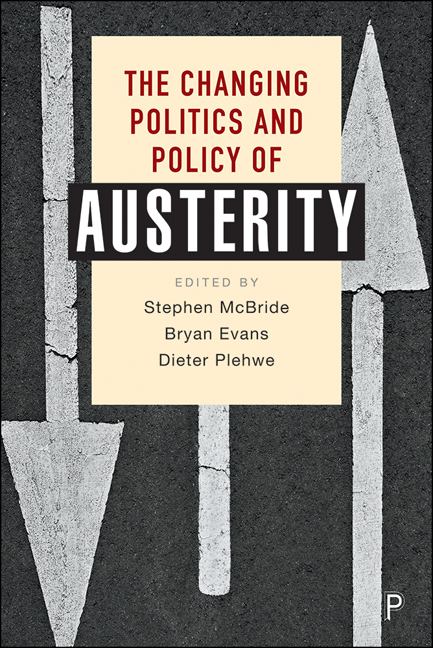Book contents
- Frontmatter
- Contents
- List of figures and tables
- Notes on contributors
- Acknowledgements
- Introduction
- PART I Austerity and the promotion of the private
- PART II Coping and casualties: labour and the social
- PART III Beyond coping: protest, pathologies and the development of real alternatives
- Conclusion
- Index
5 - Austerity and the social innovation agenda
Published online by Cambridge University Press: 13 May 2022
- Frontmatter
- Contents
- List of figures and tables
- Notes on contributors
- Acknowledgements
- Introduction
- PART I Austerity and the promotion of the private
- PART II Coping and casualties: labour and the social
- PART III Beyond coping: protest, pathologies and the development of real alternatives
- Conclusion
- Index
Summary
Social innovation has come to be widely embraced as a fresh problem-solving approach to address what are framed as stubborn and costly social policy challenges. Paradoxically, despite claims to newness, SI is often cast as a neutral path to identify ‘what works’ to solve problems. This apolitical positioning fails to contextualize the socio-economic and political dynamics in which problems and SI have arisen. This chapter engages in such a contextualization and re-politicization of the SI agenda.
The SI agenda jumped into prominence in the wake of the 2008 ‘Great Recession’ and must be understood as tightly tied to neoliberal projects of austerity. In this chapter, we argue that SI helps us to understand the ways in which the neoliberal project has proven to be ‘an adaptive creature of crisis’, embracing policy ideas and reforms needed to drive forward its agenda. Its engagement in a ‘permanent revolution’ of experimentation and policy shapeshifting has been necessary, ironically, because so much of its market-based reforms have been failures (Peck et al 2012). We argue that the movement from ‘roll back’ (‘greed-is-good’) to ‘roll out’ (‘markets-with-morals’) neoliberalism has been facilitated through SI (Peck nd) and warn that this current phase of ‘neoliberalism with a smile’ remains centred in austerity. Neoliberalism's adaptive abilities enables it to co-opt many seemingly alternative ideas, stripping them of more progressive political projects that might be at their root. For instance, the Stanford Social Innovation Review has accepted the austerity argument that there is just not enough state fiscal capacity to deal with meaningful social policy reform. It endorses a non-statist ‘realist position’ of employing the use of the non-profit sector, charity and venture-based philanthrocapitalism as a way to harness private initiative and capital for public good. Yet, this was not always the case as SI has roots in radical, restorative and transformative movements. In this chapter, we explore the lineage of SI, including its amorphous definition, seemingly conflicting idea-sets, and associated tools and techniques to understand how it has been used to extend the neoliberal project through austerity and to identify internal conflicts that might be exploited to challenge austerity politics.
- Type
- Chapter
- Information
- The Changing Politics and Policy of Austerity , pp. 103 - 124Publisher: Bristol University PressPrint publication year: 2021



